Search results for 'palettes'
-
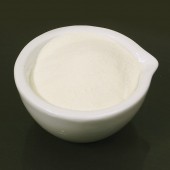
Casein Lactic
Starting at: £17.80
Casein is a protein derived from dried milk, which has been used in painting since ancient times. It can be combined with Ammonium Carbonate to form an emulsion, which acts as a durable, non-resoluble binder for pigments, producing a matte, fast-drying paint, similar in appearance to egg tempera. We use casein as a binder for our L. Cornelissen & Son Pigment Colour Charts, as it is a medium that clearly showcases the characteristics and behaviour of each pigment in its pure form. Casein paints can be applied in thin layers to watercolour paper, but would require a more rigid support, such as a gesso panel, to be applied thickly, as the comparative inflexibility of the paint layer means that it can be prone to cracking. Subsequent layers of paint should be more diluted to aid adhesion, and impasto effects are not recommended. It is possible to varnish casein paintings using an acrylic or damar varnish to obtain a glossy surface if desired, although this is not a necessary step. Casein can also be used as an ingredient in gesso, and is a suitable binder for fresco secco techniques.
Some pigments may require a wetting agent in order to fully disperse within the binder, in which case alcohol may be used.
Learn More -
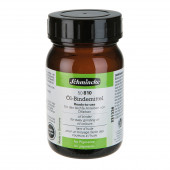
-
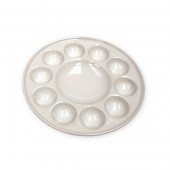
Ceramic 10 Well Round Palette
Starting at: £14.40
Call to Order
Ceramic 10 Well Round Palette Learn More -
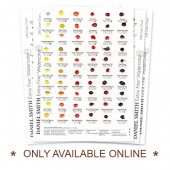
Daniel Smith 238 Try it dot Card
£25.80Daniel Smith "Try It" Dot Cards are a great way to sample this wonderful new range. Each colour dot has been placed on to a "Try It" Card which is actually watercolour paper. You can then wet each colour dot and use the card as a sort of palette. You'll be amazed just how far one dot of colour goes. You can even revisit a colour at a later date by re-wetting it. *Please note, this product is stored offsite. Please allow extra time for your order to be processed and dispatched. Learn More -
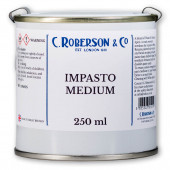
Roberson Impasto Medium
Starting at: £16.50
Roberson Impasto medium is a crack-resistant medium for impasto effects. It retains palette knife and brush strokes, giving the paint sharp, defined edges. It remains thick and doubles paint easily, drying to a matte finish. To retain colour strength, mix one part medium to one part oil colour.
Contains: Stand Oil, Damar Resin, Turpentine, Bleached Beeswax.
Learn More -
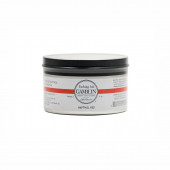
Gamblin Etching Inks 300ml
Starting at: £20.90
Gamblin Etching Inks were formulated at the request of professional printmakers in the Pacific Northwest who wanted strong reliable inks for edition printing. The palette of pure intense pigments offers a broad range of color mixing potential. Learn More -
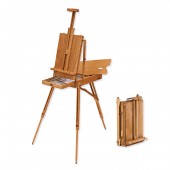
-
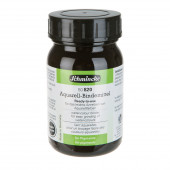
-
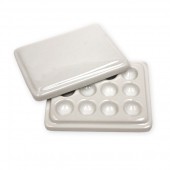
Ceramic 12 Well Palette with Lid
Starting at: £10.95
Call to Order
Ceramic 12 Well Palette with Lid Learn More -
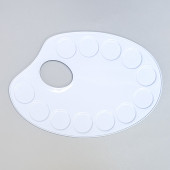
-
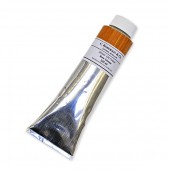
Roberson Artists' Oil Colour 225 ml
Starting at: £38.60
Unlike other commercially available oil paints, Roberson Artists' Oil Colours do not contain any fillers, extenders or stabilisers. Each paint consists solely of high-quality pigment that has been ground into cold pressed linseed oil, resulting in a highly pigmented paint. This strength of colour presents the possibility of greater economy of use and a less homogenised texture between each tube, instead allowing the unique qualities of each individual pigment to reveal themselves. By limiting our range to 59 shades, we dispense with colours that can be easily mixed, creating a focussed palette of intense, lightfast paints that offer limitless combinations.
Available in 40ml and 225ml tubes
Learn More -
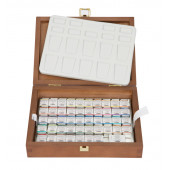
Schmincke Horadam Box 48 Half Pans
Starting at: £320.55
Schmincke Horadam Box 48 Half Pans. Learn More -
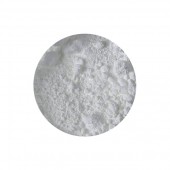
Zinc White Pigment
Starting at: £4.00
Zinc White, or Zinc Oxide, is an artificial mineral pigment that was first produced in France in the late 18th century. Its use in commercial watercolours as Chinese White pre-dates its inclusion in oil painting. It is a semi-opaque, lightfast pigment, which dries very slowly in oil. Of all white pigments, it produces the most brittle paint film, so is not recommended in large quantities for impasto techniques. However, it is a good addition to a palette which requires a less overwhelming white than Titanium White.
Toxicity: B
Learn More -
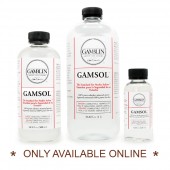
Gamblin Gamsol Mineral Sprit
Starting at: £9.30
Gamsol is an odourless mineral spirit created by the American company Gamblin. They describe it as "the safest solvent that allows oil painters to utilize all traditional painting techniques without compromise."
Please see below for Gamsol's primary applications.
Learn More -
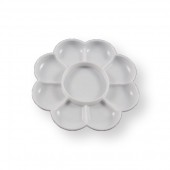
Plastic 9 Well Flower-shaped Palette
Starting at: £2.95
Plastic 9 Well Flower-shaped Palette Learn More -
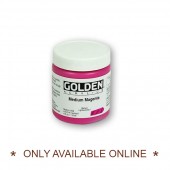
Golden Heavy Body Acrylic 119ml
Starting at: £16.20
The first acrylic colors offered by Golden Acrylic, Heavy Body paints are known for their exceptionally smooth, buttery consistency. The Heavy Body palette includes the largest assortment of unique pure pigments in a 100% acrylic emulsion available to professional artists. These colours offer excellent permanency and light-fastness. There are no fillers, extenders, opacifiers, toners, or dyes added. *Please note, this range is stored offsite. Please allow extra time for your order to be processed and dispatched. Learn More -
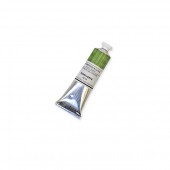
Roberson Artists' Oil Colour 40 ml
Starting at: £9.35
Unlike other commercially available oil paints, Roberson Artists' Oil Colours do not contain any fillers, extenders or stabilisers. Each paint consists solely of high-quality pigment that has been ground into cold pressed linseed oil, resulting in a highly pigmented paint. This strength of colour presents the possibility of greater economy of use and a less homogenised texture between each tube, instead allowing the unique qualities of each individual pigment to reveal themselves. By limiting our range to 59 shades, we dispense with colours that can be easily mixed, creating a focussed palette of intense, lightfast paints that offer limitless combinations.
Available in 40ml and 225ml tubes
Learn More -
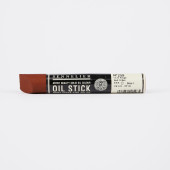
Sennelier Oil Sticks
Starting at: £7.65
Solid artists' quality oil paint sticks. (Ø = 3/4 ; length = 5" ) SENNELIER Extra-Fine Solid Oil Sticks can be used alone or in combination with oil colours in tubes. The oil stick colours can be used for an entire painting. They are applied directly to any traditional oil-painting support, such as canvas, wood panel or fine art paper. They need the same archival priming (acrylic gesso or oil ground) that oil paint requires. Surfaces: Before use, the surface film of the oil stick must be peeled off. It will form again after a few days of non-use, protecting and conserving the colour. The oil sticks must be applied in a thin film application of no more than 1mm thick. Once applied they can be painted over with oil stick or oil paint and if desired be diluted with turpentine. Oil stick Medium, a colourless oil stick, may be used to produce transparent effects and glazes. Once applied, the oil stick surface will dry in 2 to 5 days, depending on the atmospheric conditions Varnishing: If varnishing is desired, you must wait 6 months (as in traditional oil paint) until the colour is completely dry, before giving the painting a final coat of picture varnish. Use a soft brush to varnish so that the oil stick marks are not disturbed. SENNELIER Extra-Fine Solid Oil Stick colours are either opaque (O) or transparent (T) depending on the nature of the pigment in each colour. Oil Sticks do not change during storage and require no special precautions except to be kept away from any source of heat, which could adversely affect the stick. Application Techniques After applying the colour with the point or the edge of the oil stick, colours can be mixed directly on the support using the following methods: • Blending, with brush, finger, or drawing stump. With or without turpentine • Wash-drawing, dilute colours with turpentine or mineral spirit • Retouching, with oil stick, palette knife or brush • Textures, thick application oil stick colour. Retouch with a brush or palette knife •Sgraffito, scratching a layer of fresh paint with a point (brush handle, palette knife, etc.) to reveal the layer below. Sgraffito is related to engraving, and is used not only for revealing the under-layers of paint but also to scratch and clean unsatisfactory parts of the painting •Interior Decoration, on glass, ceramics etc. Use for decorative purposes only Learn More -
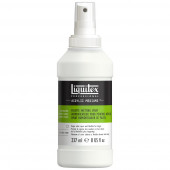
-
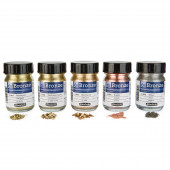
Schmincke Oil Bronze, 50 ml
Starting at: £25.10
For brilliant metal effects on oil paintings. Also suitable for wood, metal and gypsum surfaces. Use with Schmincke Bronze Medium (recipe below). Learn More -
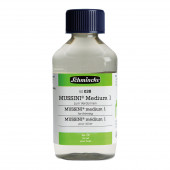
Schmincke Mussini Medium 1
Starting at: £10.80
Low-fat (lean) painting and thinning medium for oil colours. Recommended for thin grounds and for creating transparent layers over gouache, tempera and acrylic paintings. Thins with minimal affect on drying time and gloss. Dosage: 10% to max. 20% Contains: Safflower oil, natural and synthetic resins, mineral spirit. Learn More -
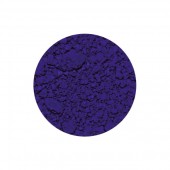
Ultramarine Blue Limewash Pigment
Starting at: £7.50
PB29
Ultramarine Blue Limewash is an artificial mineral pigment that is produced by heating clay, soda, sulphur and coal to high temperatures. Its name comes from outremer, or over-the-sea, as a reference to the highly-prized Lapis Lazuli pigment which had been imported into Europe from Afghanistan since the Middle Ages. First manufactured in France and Germany in 1828, synthetic Ultramarine provided a brilliant and affordable blue to artists, and it remains one of the most popular blues on artists' palettes today.
It is a transparent pigment, with a high tinting strength and excellent lightfastness. Most Ultramarine colours react to alkali and are therefore unsuitable for use in lime-fresco; Limeproof Ultramarine Blue remedies this problem. It is stable in all other media, although it can be tricky to grind in oil. Instead of creating a thick, buttery paste, it can remain stringy and deteriorate when stored in a tube. To correct this, many commercial paint manufacturers include additives and waxes in their recipes; if you intend on grinding your own paint, you could try replacing 10-15% of your Linseed Oil with Poppy Oil to improve the consistency. Ultramine Blue provides a slow-drying, fairly hard paint film, which can tend towards brittleness.
Toxicity: B
Learn More -
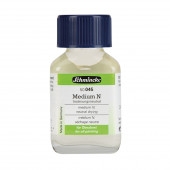
Schmincke Medium N
Starting at: £10.80
This product does not contain turpentine, and is therefore suitable for artists with allergies. A 'neutral', nearly non-yellowing painting and thinning medium for oil colours. Applicable for all painting techniques except for ground motifs on slightly absorbent undergrounds (not “lean” enough). Low impact on drying time. Thinner: Terpin (50023) (max. 30%). Dosage: 10 to max. 20%. Learn More -
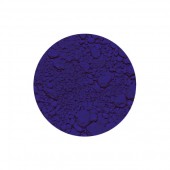
Ultramarine Blue Light Pigment
Starting at: £6.00
PB29
Ultramarine Blue Light is an artificial mineral pigment that is produced by heating clay, soda, sulphur and coal to high temperatures. Its name comes from outremer, or over-the-sea, as a reference to the highly-prized Lapis Lazuli pigment which had been imported into Europe from Afghanistan since the Middle Ages. First manufactured in France and Germany in 1828, synthetic Ultramarine provided a brilliant and affordable blue to artists, and it remains one of the most popular blues on artists' palettes today.
It is a transparent pigment, with a high tinting strength and excellent lightfastness. It reacts to alkali, therefore it is not suitable for use in lime-fresco; we do offer a Limeproof Ultramarine Blue for this purpose. It is stable in all other media, although it can be tricky to grind in oil. Instead of creating a thick, buttery paste, it can remain stringy and deteriorate when stored in a tube. To correct this, many commercial paint manufacturers include additives and waxes in their recipes; if you intend on grinding your own paint, you could try replacing 10-15% of your Linseed Oil with Poppy Oil to improve the consistency. Ultramine Blue provides a slow-drying, fairly hard paint film, which can tend towards brittleness.
Toxicity B
Learn More -
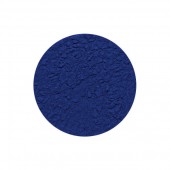
Ultramarine PB29 Pigment
Starting at: £9.10
PB29
Ultramarine Blue is an artificial mineral pigment that is produced by heating clay, soda, sulphur and coal to high temperatures. Its name comes from outremer, or over-the-sea, as a reference to the highly-prized Lapis Lazuli pigment which had been imported into Europe from Afghanistan since the Middle Ages. First manufactured in France and Germany in 1828, synthetic Ultramarine provided a brilliant and affordable blue to artists, and it remains one of the most popular blues on artists' palettes today.
It is a transparent pigment, with a high tinting strength and excellent lightfastness. It reacts to alkali, therefore it is not suitable for use in lime-fresco; we do offer a Limeproof Ultramarine Blue for this purpose. It is stable in all other media, although it can be tricky to grind in oil. Instead of creating a thick, buttery paste, it can remain stringy and deteriorate when stored in a tube. To correct this, many commercial paint manufacturers include additives and waxes in their recipes; if you intend on grinding your own paint, you could try replacing 10-15% of your Linseed Oil with Poppy Oil to improve the consistency. Ultramine Blue provides a slow-drying, fairly hard paint film, which can tend towards brittleness.
Toxicity: B/C
Learn More -
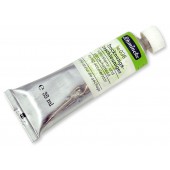
Schmincke Drying Accelerator for Oils
Starting at: £8.55
From the Schmincke website:
Jelly-like medium for accelerating the drying of oil colours. Preserves consistency and degree of gloss. Dosage: 10% to 30% maximum. Contains: Siccative, stand oil, resin solution, mineral spirit.
Learn More -
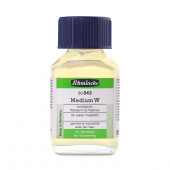
Schmincke Medium W
Starting at: £10.80
Schmincke Medium W is an odourless, jelly-like ("lean") medium for mixing oil colours with water instead of organic solvents such as turpentine or turpentine substitute. It increases gloss and transparency, reduces viscosity and harmonizes the drying process.
Dosage: 50%
Thinner: Water
Learn More -
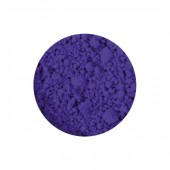
Ultramarine Blue Dark Pigment
Starting at: £4.00
PB29
Ultramarine Blue Dark is an artificial mineral pigment that is produced by heating clay, soda, sulphur and coal to high temperatures. Its name comes from outremer, or over-the-sea, as a reference to the highly-prized Lapis Lazuli pigment which had been imported into Europe from Afghanistan since the Middle Ages. First manufactured in France and Germany in 1828, synthetic Ultramarine provided a brilliant and affordable blue to artists, and it remains one of the most popular blues on artists' palettes today.
It is a transparent pigment, with a high tinting strength and excellent lightfastness. It reacts to alkali, therefore it is not suitable for use in lime-fresco; we do offer a Limeproof Ultramarine Blue for this purpose. It is stable in all other media, although it can be tricky to grind in oil. Instead of creating a thick, buttery paste, it can remain stringy and deteriorate when stored in a tube. To correct this, many commercial paint manufacturers include additives and waxes in their recipes; if you intend on grinding your own paint, you could try replacing 10-15% of your Linseed Oil with Poppy Oil to improve the consistency. Ultramine Blue provides a slow-drying, fairly hard paint film, which can tend towards brittleness.
Toxicity: B
Learn More -
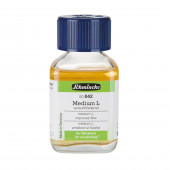
Schmincke Medium L
Starting at: £9.30
Schmincke Medium L is a jelly-like medium for “soft” painting with oil colours. It improves flow and reduces brush strokes, accelerates drying, increases gloss and transparency. There is no change of the product quality based on the colour change of the raw material alkyd resin. Close immediately after use. Contains: alkyd resin, mineral spirit, siccative. Dosage:10% to 20% maximum. Thinner: Turpentine substitute Learn More -
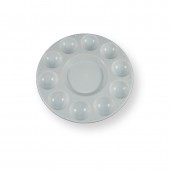
Plastic 10 Well Round Palettes
Starting at: £1.70
Call to Order
Plastic 10 Well Round Palettes Learn More





